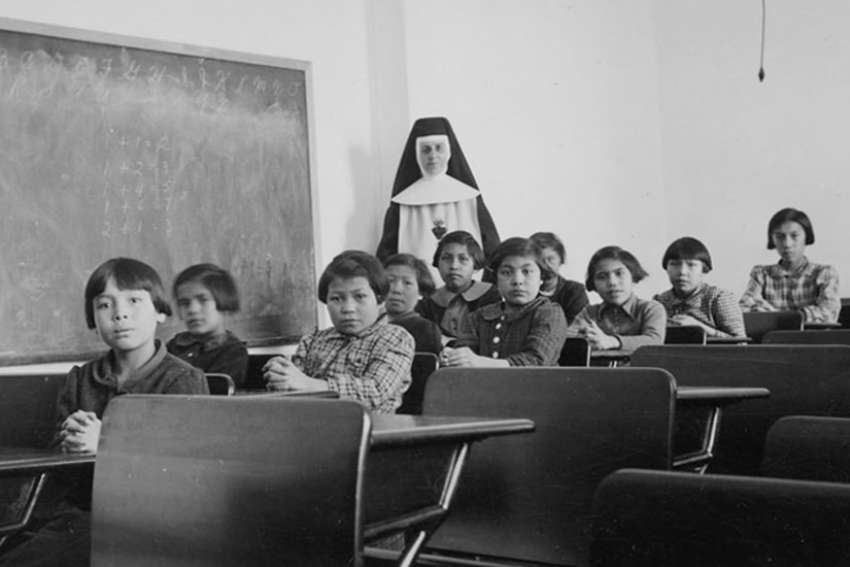But Church officials and Indigenous leaders recognize there is still some way to go.
Released in 2015, the TRC report included 94 Calls to Action to achieve true reconciliation, including two — Calls to Action 48 and 49 — aimed directly at church parties to the 2006 Indian Residential Schools Agreement. These call for churches to adopt and comply with the principles of UNDRIP (the United Nations Declaration on the Rights of Indigenous Peoples) as a framework for reconciliation, and calls on religious denominations and faith groups to repudiate concepts used to justify sovereignty over Indigenous peoples and their lands.
In 2016, the Canadian Conference of Catholic Bishops (CCCB) released a document outlining the Catholic commitment to UNDRIP, and earlier this month the federal government of Canada followed through with legislation to implement the Declaration. But the work has just begun.
“We still have a long way to go because we’re a society still marked by injustice in so many ways,” said Regina Archbishop Donald Bolen. “In societal indicators of wellbeing, such as employment rates, suicide rates, access to health, access to good drinking water, access to education, incarceration rates and poverty rates, in almost every area Indigenous people in Canada are on the losing end.
“That just points to a systematic injustice and embedded racism and the need to be very proactive (as the Church) in accompanying Indigenous people in their struggle for justice.”
While Bolen believes the TRC has been effective in moving the conversation around reconciliation to the forefront in the Church, he says the document serves as a reference point as the Church works to support and uphold the dignity of Indigenous people in any way needed, whether directly outlined in the TRC or not. A large part of that, he says, comes from listening to Indigenous voices and honouring their valuable contributions to Canadian society now and going into the future.
“I think recent teachings of Pope Francis, especially on the environment, highlight the wisdom that we need to learn in order to go forward,” said Bolen. “Often that wisdom is very well articulated in Indigenous traditions, understanding of the land, understanding of creation and our relationship with other creatures.
“I always find it beautiful to hear an Indigenous prayer, which acknowledges the two leggeds and the four leggeds, the swimmers and the winged ones. It speaks so beautifully of other creatures and our relationship with the rest of creation.”
Bolen has made reconciliation a priority in Regina, establishing the Archdiocesan Commission for Truth and Reconciliation.
Overall, the pace of moving forward has been glacial. Truth and Reconciliation commissioners Sen. Murray Sinclair, Chief Wilton Littlechild and Dr. Marie Wilson expressed concerns in a Dec. 15 statement, saying there has been a “slow and uneven pace of implementation of the Calls to Action.”
Graydon Nicholas, newly appointed Chancellor of St. Thomas University in Fredericton, N.B., agrees.
“There have been some accomplishments that have been made when it comes to child welfare, the issue of languages and the fact that there was an actual inquiry launched on murdered and missing Indigenous women and girls,” said Nicholas, who was born into a Maliseet family on New Brunswick’s Tobique First Nation and is also Chair of Native Studies at St. Thomas. “But there are also other things that need to be considered very soon if the (TRC report) is going to have any momentum into the future.”
One of the major areas of concern has been lack of progress by the federal government on Call to Action 53, to establish a National Council for Reconciliation to assess and promote reconciliation efforts. When Nicholas first read the TRC document in 2015 he recognized this point as an important pillar in ensuring the Canadian government is held accountable to fulfill all TRC commitments. It took two years for an interim board to be appointed to create a report to examine what could be done in regards to this. The report was filed in 2018.
“Unfortunately, it’s been sitting I guess in the ministry office or whoever’s responsible since that time and nothing has been done about it,” said Nicholas. “I think to me, that’s one of the major disappointments, because (the National Council for Reconciliation) is what we need structurally to make sure that things happen.”
Bolen has served in both the Saskatoon and Regina dioceses in his home province of Saskatchewan where there are large Indigenous populations within each diocese — both First Nations and Métis peoples. He describes the relationships he has built with the Indigenous communities as “life giving.” Looking at the bigger picture of reconciliation beyond the TRC, he’s committed to working side by side with Indigenous communities to achieve the healing and progress necessary as a diverse Church community.
“I have really learned so much and benefited so much setting up structures to grow those relationships and deepen that spirit of walking together, that reflects the TRC,” said Bolen. “As a Church, we’re not taking our starting point from the TRC but from the challenges faced by Indigenous people today and a desire to want to work together.”


